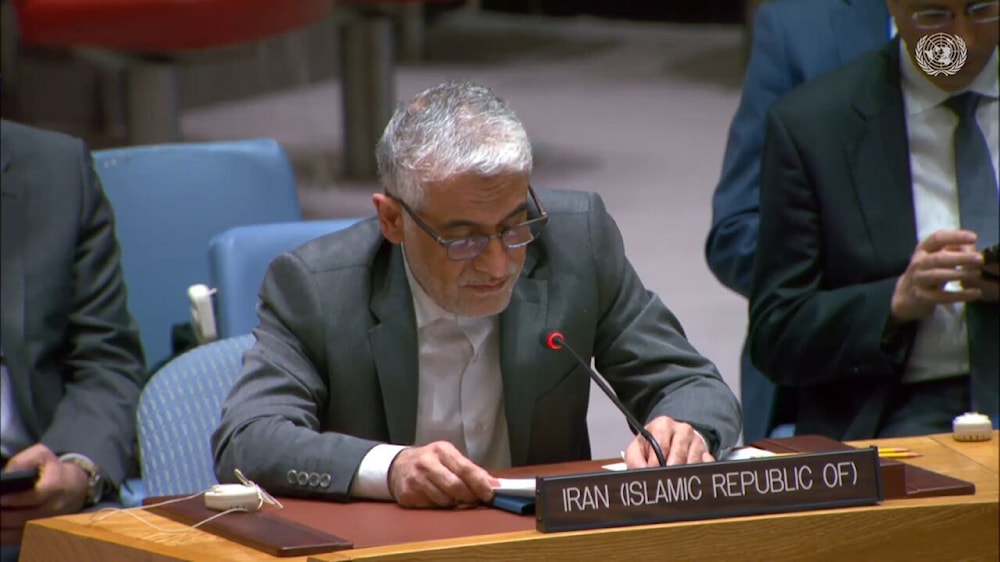Russia, Iran UN envoys denounce Israeli aggression on Syria
The top Iranian envoy to the UN continued by saying that some nations have used armed means to advance their political agendas in Syria since the conflict started in 2011.
-

Iran's Ambassador and Permanent Representative to the UN Amir Saeed Iravani (UN)
Iran's Ambassador and Permanent Representative to the UN Amir Saeed Iravani said that there is no military solution to the Syrian crisis, adding that the Islamic Republic of Iran considers the Israeli regime's military and illegal attacks in Syria provocative and strongly condemns them.
Iravani spoke on behalf of Syria and the Middle East issue at the UN Security Council meeting.
The envoy made the remarks at the meeting of the United Nations Security Council about the situation in the Middle East and Syria.
"The Zionist regime must Take responsibility for these aggressive actions and put an end to them immediately," he added.
In addition to pointing out that the war began 13 years ago this month, he said, "During these 13 years, the Syrian people have suffered a lot and this conflict has had adverse consequences on peace, security, and stability throughout the region."
The top Iranian envoy to the UN continued by saying that some nations have used armed means to advance their political agendas in Syria since the conflict started in 2011.
On another note, Russia's ambassador to the United Nations, Vasily Nebenzia, said Thursday that Israeli strikes on Syria could lead to a wider regional conflict and that Moscow condemns the attacks.
Nebenzia told a meeting of the UN Security Council that Russia is concerned about the increasing number of Israeli airstrikes against Syrian civilian sites, including from the Blue Line area, which he called irresponsible acts.
He added that the attacks were a flagrant violation of Syrian sovereignty and the basic norms of international law and warned of their serious negative consequences for the timely humanitarian response of UN agencies.
Nebenzia said that the United States had long stopped fighting ISIS in Syria and that it is using militants for its own purposes.
Syria condemns Israeli aggression
The Syrian ambassador to the United Nations, Qusay al-Dahhak, criticized countries that claim to be concerned about human rights while at the same time supporting the genocide in Gaza and the repeated Israeli aggression against his country. He said that the repeated Israeli airstrikes threaten regional and international peace and security.
Al-Dahhak reiterated his country's emphasis on the content of its letters to the Secretary-General and the head of the Security Council, calling for immediate action to stop the hysterical Israeli attacks and prevent their recurrence.
He said that the Western countries that are biased toward the Israeli occupation cannot be expected to have a just position in the Security Council, warning the occupation against continuing its aggression, which threatens international peace and security.
Al-Dahhak stressed that Syria was cooperating with the United Nations and working to address the problems, and he considered that the Western countries preferred to turn a deaf ear and a blind eye to the achievements of the Syrian government and preferred to support terrorist organizations.
The Syrian ambassador called for the immediate, complete, and unconditional lifting of the policies of siege and collective punishment of people by the United States and Europe, stressing his country's rejection of linking aid to political conditions.
Al-Dahhak expressed Syria's appreciation for the Russian and Armenian support in cleaning up sites laden with mines, which claim the lives of hundreds of Syrians every year, calling for the deployment of the UN Mine Action Service in Syria.
He stressed Syria's welcome to hold a meeting of the Constitutional Committee in an agreed-upon place, stressing the need to commit to the sovereignty, independence, and unity of the Syrian territories, and called for the end of the foreign military presence on Syrian territory and the looting and support for terrorism that accompanies it.
Iran envoy says aid insufficient
Iran's ambassador to the United Nations, Amir Saeid Iravani, attacked Western countries over their support of terrorist groups on Syrian territory.
Iravani stressed the need to recognize that there is no military or coercive solution through siege and prevention of aid and development for the Syrian people, calling on the international community to reject these steps that violate international law and prolong the conflict.
Iravani stressed that humanitarian aid is not the solution, considering that the important thing is to create a climate for the safe return of refugees and to lift the sanctions that further constrain the humanitarian conditions of the Syrian people.
The Iranian ambassador reiterated his country's support for the Syrian-Syrian solution in a manner that preserves Syria's unity, sovereignty, and independence.
Early on Tuesday, Syrian air defenses intercepted hostile targets in the vicinity of the city of Yabroud in the countryside of the capital, Damascus.
A Syrian military source confirmed that an Israeli aerial attack from the direction of the occupied Syrian Golan Heights targeted several military points in the countryside of Damascus.
The military source mentioned that Syrian air defense systems intercepted the Israeli missiles and shot down some of them, with losses limited to material damages.
Earlier, Al Mayadeen's correspondent reported explosions in the skies around the Syrian capital.
This came days after Syrian air defenses confronted an aggression that targeted the Qalamoun Mountains and the vicinity of the town of al-Qastal, in the countryside of Damascus.
Our correspondent reported hearing successive explosions in the Qalamoun area near the city of Nabek, north of Damascus.
A Syrian military source confirmed back then that the Israeli aerial aggression was launched from the direction of the occupied Syrian Golan Heights and targeted several points in the southern region.
The source confirmed that Syrian air defenses intercepted the missiles, with some being shot down, adding that the Israeli aggression resulted in the injury of a soldier, in addition to some material losses.

 6 Min Read
6 Min Read








